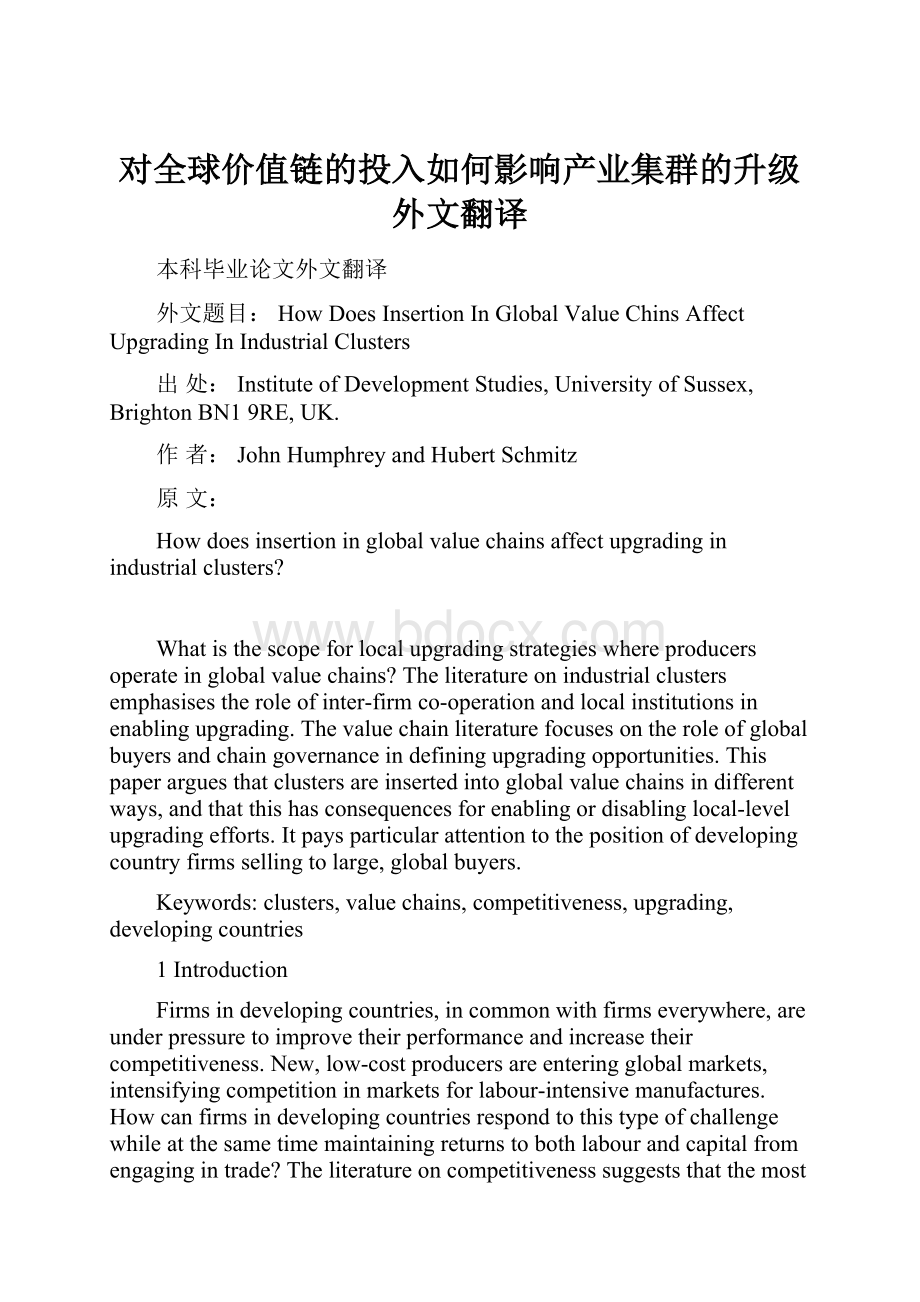对全球价值链的投入如何影响产业集群的升级外文翻译.docx
《对全球价值链的投入如何影响产业集群的升级外文翻译.docx》由会员分享,可在线阅读,更多相关《对全球价值链的投入如何影响产业集群的升级外文翻译.docx(10页珍藏版)》请在冰豆网上搜索。

对全球价值链的投入如何影响产业集群的升级外文翻译
本科毕业论文外文翻译
外文题目:
HowDoesInsertionInGlobalValueChinsAffectUpgradingInIndustrialClusters
出处:
InstituteofDevelopmentStudies,UniversityofSussex,BrightonBN19RE,UK.
作者:
JohnHumphreyandHubertSchmitz
原文:
Howdoesinsertioninglobalvaluechainsaffectupgradinginindustrialclusters?
Whatisthescopeforlocalupgradingstrategieswhereproducersoperateinglobalvaluechains?
Theliteratureonindustrialclustersemphasisestheroleofinter-firmco-operationandlocalinstitutionsinenablingupgrading.Thevaluechainliteraturefocusesontheroleofglobalbuyersandchaingovernanceindefiningupgradingopportunities.Thispaperarguesthatclustersareinsertedintoglobalvaluechainsindifferentways,andthatthishasconsequencesforenablingordisablinglocal-levelupgradingefforts.Itpaysparticularattentiontothepositionofdevelopingcountryfirmssellingtolarge,globalbuyers.
Keywords:
clusters,valuechains,competitiveness,upgrading,developingcountries
1Introduction
Firmsindevelopingcountries,incommonwithfirmseverywhere,areunderpressuretoimprovetheirperformanceandincreasetheircompetitiveness.New,low-costproducersareenteringglobalmarkets,intensifyingcompetitioninmarketsforlabour-intensivemanufactures.Howcanfirmsindevelopingcountriesrespondtothistypeofchallengewhileatthesametimemaintainingreturnstobothlabourandcapitalfromengagingintrade?
Theliteratureoncompetitivenesssuggeststhatthemostviableresponseisto‘upgrade’-tomakebetterproducts,makethemmoreefficiently,ormoveintomoreskilledactivities(PORTER,1990;KAPLINSKY,2000).
Severalschoolsofthoughthaveemphasisedthelocaldeterminantsofcompetitiveness,includingthe‘neweconomicgeography’,businessstudies,regionalscienceandinnovationstudies.Notonlyissomeofthisliteratureoptimisticaboutthepossibilityofstrengtheningcompetitivenessthroughlocalorregionalindustrialpolicy(e.g.COOKEandMORGAN,1998;PYKE,1992),butithasalsobeenarguedthatinaglobalisingeconomytheonlyenduringbasisforcompetitiveadvantagewillbelocalisedandbasedontacitknowledge:
"theformationoftheworldmarket...increasestheimportanceofheterogeneous,localisedcapabilitiesforbuildingfirm-specificcompetences"(MASKELLandMALMBERG,1999:
172).Theanalysisofindustrialclustersindevelopingcountriesbuildsontheseperspectives,focusingontheroleoflocallinkagesingeneratingcompetitiveadvantageinlabour-intensiveexportindustriessuchasfootwearandgarments.However,theseproductsarepreciselytheonesinwhichglobalbuyers(whetheragents,retailersorbrand-namecompanies)havecometoplayanincreasinglyimportantroleintheorganisationofglobalproductionanddistributionsystems.Oneofthemainliteratureswhichanalysesthesesystems,globalvaluechainresearch,2takesaverydifferentapproachtothequestionofupgrading,emphasisingcross-borderlinkagesbetweenfirmsinglobalproductionanddistributionsystemsratherthanlocallinkages(GEREFFIandKORZENIEWICZ,1994;GEREFFIandKAPLINSKY,2001).
Howcanthesetwoliteraturesbereconciled?
Oneemphasisestheimportanceoflocallinkagesandtheothergloballinkages.Clearlythereisaneedtobringthesetwoperspectivestogether,particularlyinthecaseofexportorientedclustersthatareinsertedintoglobalvaluechains.Thispaperprovidesameansofdoingthis.
Thequestionwhichdrivesthispaperishowinsertionintoglobalvaluechainsaffectslocalupgradingstrategies.Inordertoanswerthisquestionwedistinguishbetweendifferenttypesofupgradinganddifferenttypesofchains.Forthelatter,wefocusonthewaythechainisco-ordinated.Thepapersuggeststhatthereisacontinuumfromarm's-lengthmarketrelationshipsthroughtohierarchicalgovernance(verticalintegration).Inbetween,therearetwoparticularlyimportanttypesofco-ordinationofglobalvaluechains:
networksbringingtogetherpartnerswithcomplementarycompetences,andquasihierarchyinwhichthereisasymmetryofcompetenceandpowerinfavourofoneparty(frequentlytheglobalbuyer).Thepaperpaysparticularattentiontothequasi-hierarchicalformofchaingovernance,explainingwhyitiscommoninsourcingfromdevelopingcountriesandhowitaffectstheupgradingoflocalfirms.
Wecametothisquestionthroughourresearchonclustersindevelopingcountrieswhereproducersfoundthemselvesinasymmetricalrelationshipswiththeircustomers.Theseproducerswerefacingpowerfulglobalbuyerswhohadamajorinfluencenotjustonsalesbutalsoonthetypeofupgradingstrategiesopentothem.Sincethen,wefoundthatthisissueisnotconfinedtodevelopingcountryclusters.Rabellotti(2001)findsasimilarproblemfacingshoeproducersinItaly.
Whyisthereaproblem?
Whyisitimportanttoaskhowinsertionintoglobalvaluechainsaffectsupgradinginthecluster?
Boththeclusterliteratureandtheglobalvaluechainresearchemphasisethatinteractioniscentraltoupgrading,butonegivesprimeimportancetotheinteractionwithlocalfirmsandinstitutionsandtheotheraccordsprimeimportancetotheinteractionwiththeglobalbuyers.Ifthiswasjustamatterofdifferentemphasesitwouldbeeasytobringtogetherthetwoapproachesandsimplyregardthemascomplementary.However,thefusionisfarfromstraightforwardbecausetheinteractionwiththeglobalbuyertendstotakeplaceinthecontextofaveryunevenrelationship.Thisinequalitytransformsrelationshipsandupgradingtrajectories.Aswillbeshowninthecourseofthepaper,localproducersworkingforglobalbuyersenjoyconsiderableadvantagesinsometypesofupgradingbutencounterbarriersinothertypes.Thepaperalsoaskswhetherthesebarriersarepermanentanddiscusseshowtheycanbeovercome.
Thispaperisdividedintothreefurthersections.Section2discussesthetreatmentofupgradingintheclusterandvaluechainliteratures.Section3distinguishesbetweendifferentformsofgovernanceinglobalvaluechainsandanalyseswhytheyarise.Section4considershowthedifferenttypesofglobalvaluechainsaffecttheupgradinginindustrialclusters,payingparticularlyattentiontohowrelationshipsandupgradingprospectschangeovertime.
2Upgradinginclustersandvaluechains
Withthedeepeningintegrationofdevelopingcountriesintoglobalmarkets,firmsinthesecountriesfaceincreasingcompetitivepressure.Forproducerstomaintainorincreaseincomesinthefaceofthispressure,theymusteitherincreasetheskillcontentoftheiractivitiesand/ormoveintomarketnicheswhichhaveentrybarriersandarethereforeinsulatedtosomeextentfromthesepressures.Werefertosuchshiftsinactivitiesasupgrading.
Boththeclusterandvaluechainapproachesemphasisetheimportanceofupgradinginordertofaceincreasingcompetitioninglobalmarkets.Similarly,bothemphasisetheroleplayedbygovernanceinupgrading,usingthetermgovernancetodenoteco-ordinationofeconomicactivitiesthroughnon-marketrelationships.Governanceisparticularlyimportantforthegeneration,transferanddiffusionofknowledgeleadingtoinnovation,whichenablesfirmstoimprovetheirperformance.However,thetwoapproachesseegovernanceoperatingatquitedistinctloci,withquitedistinctimplicationsforlearningwithinclustersorchainsandupgradingopportunitiesforfirmsindevelopingcountries.
3Valuechaingovernance
Globalvaluechainanalysisisconcernedwithhowglobalproductionanddistributionsystemsareorganised.Theseinvolverecurrenttransactionsbetweenvariousfirms.Howsuchtransactionsmightbeorganisedhasbeenaddressedbytransactioncostseconomics(see,forexample,WILLIAMSON,1975;WILLIAMSON,1979).Insituationscharacterisedbyuncertainty,boundedrationality(informationmaynotbeavailable,oronlyacquiredatacertaincost)anddifferencesofinterestbetweeneconomicagents,co-ordinationarrangementshavetobecreatedwhichminimisetotalproductionandtransactioncosts.Thekeyquestionsforco-ordinationare:
Whatistobeproduced.Thisinvolvesthedesignofproducts,bothinbroadconceptionanddetailedspecifications.
Howitistobeproduced.Thisinvolvesthedefinitionofproductionprocesses,whichcanincludeelementssuchasthetechnologytobeused,qualitysystems,labourstandardsandenvironmentalstandards.
Physicalproductflow:
howmuchistobeproduced,when,andhowtheflowofproductalongthechainistobehandled.
Thetransactioncostsliteratureidentifiesmarketandhierarchyastwocommonco-ordinationarrangements.Marketsareparticularlyeffectiveforstandardproducts.Co-ordinationrequirementsbetweendifferentpointsinthechainarelow,valuationoftheproductandmonitoringofsupplierperformanceisrelativelyeasy,andeconomiesofscalearelikelytobesignificant.Buyerandsuppliermaintainarm’slengthmarketrelations.Thisimpliesthattheproductis(a)standard,orcanbecustomisedeasily,or(b)ismadefromdrawingsprovidedbythebuyer(ineffect,purchasingtheproducer'sstandardproductionskills).Thisfurtherimpliesthatthebuyer'srequirementscouldbemetbyarangeoffirms.Ifparticularprocesscapabilitiesorproceduresarerequired,theyaremetthroughtheapplicationofnon-transactionspecificstandards,frequentlyverifiedbyindependentcertification.Asproductsbecomemorecustomisedtotheneedsofparticularbuyers,orwhenitbecomesdifficulttomonitortheperformanceofthesupplierortovaluetheproductbeingsupplied,transactioncostsincrease.Costsincreaseasbuyerandsellerneedtointeractmoreclos